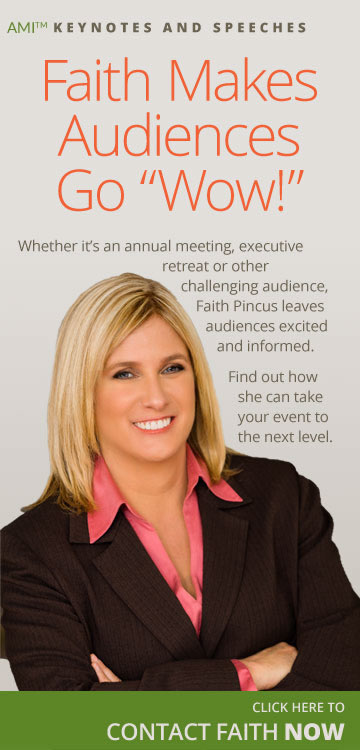Six questions to ask about your audience
Can you imagine going to a dinner party where the host and hostess put out all their favorite dishes and beverages without any consideration for the dietary restrictions or tastes of the group they were serving? It would be a breach of etiquette at the very least, and result in a houseful of very disgruntled guests (if it didn’t actually send someone with a specific allergy to the hospital!)
In much the same way, a speaker who prepares his or her material without ever considering the audience is in for some rough going. It’s one of the classic mistakes speakers make. It’s tempting to want to decide on a topic that you like and craft a speech that you are interested in. But it can leave you with a roomful of listeners that are confused, bored or offended – not a pretty picture.
So say it with me: Your audience matters.
Do your homework before you present
The very first thing you’ll want to do when preparing your presentation is to find out as much as you can about your audience so you can tailor your speech to their needs. However, as it is sometimes difficult to obtain this information, at a minimum you do have to decide who your audience is and what their needs may be, generally.
No one is ever asked to speak to a completely unknown audience on a random topic, so some information must be available to you at the outset: the subject of your presentation, the location of the event, basic background on the audience, and why they might be there in the first place.
If you have no access to your audience in advance to determine their actual background, then at least answer for yourself the types of questions listed below (and anything else you can think of that will help you tailor your presentation to your audience):
- What is the title of my presentation, if created by someone else? (This is a rare occurrence but it happens. )
- 2. What is the event? Depending on where you are speaking, you’ll want to tailor your presentation accordingly. Is this a formal event where you are expected to be more reserved and less casual in your delivery? Are you trying to convince your audience to see a certain topic in a different way? Are you selling something or trying to market an idea or product? Are you delivering instructions or running an educational seminar? Is this venue that allows for audience-presenter back-and-forth or a more rigid setting? All of these things will factor into your preparation, so do your homework.
- What is the time of day you will be speaking? This is a key question that is often overlooked. Because I’m here to tell you: Afternoon sessions are entirely different than morning sessions. In the morning, audiences tend to be well-rested, full of coffee, ready to perk up and listen to you. By 2:30 in the afternoon, once they’ve had a full day of listening to speakers and had their lunch, half the crowd is likely to be nodding off if you don’t keep the energy up and give them something to see that will keep them awake. If you’re ever given the choice? Pick the morning slot. You won’t regret it.
- 4. What is the nature of the audience? No two groups are the same. Audiences come in all shapes, sizes and persuasions and thinking of them as a single, simple entity (a “group”) isn’t going to get you anywhere. So find out: Is your audience a group mildly interested in your topic just to stretch their minds or a group of avid listeners hoping to hear something that will benefit them in job growth or something equally compelling? How many people are likely to be there — 20? Thirty? A thousand? Dig around as much as you can. Surprises are not your friend.
- 5. Why are they here? Some audiences are predisposed to be friendly, but not always. Find out why this group has been assembled and it will go a long way toward telling you how to make your first approach to them. Is attendance at this presentation mandatory? Have they paid to hear you speak? Did they choose to hear you speak, even if they didn’t pay (as in a free webinar)? Are you on the agenda because a planner or partner chose you, not the attendees? When you are looking at this question, set your ego aside and look at it from the audience’s perspective, regardless of your fame or infamy.
- What are you going to provide? This is where you set your goal. What exactly to you want to accomplish during this speech? What do you think they want to hear about and walk away with? What will motivate, educate, or activate them (based on their needs)? Set a specific goal (i.e. “I want them to have the tools to become better public speakers” or “I want them to understand significant changes in the law in this area that have seriously complicated litigation as well as settlement efforts” or “they should leave with a thorough understanding of good and bad writing techniques from the court’s perspective). Then set out to accomplish that goal. Without a goal…you’re just talking.
Remember, good speeches are about meeting your audience’s needs first. That’s how you excel and how you are remembered. Speakers many times are self-focused instead of audience focused. But the best speakers focused on the needs and wants of their audience, first and foremost. Set a goal to become one of those types of speakers and you’ll already be appreciated more than most speakers out there.


